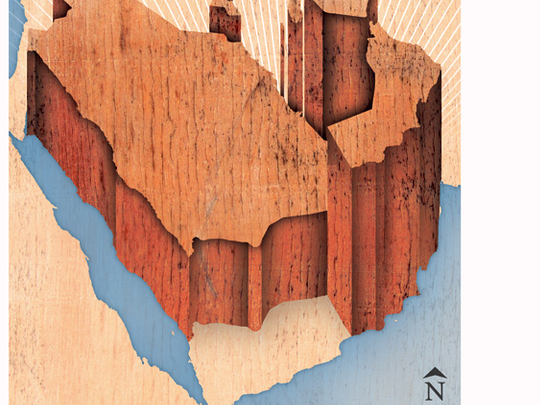
More than a decade ago, Egyptian journalist-turned-author Mohammad Hassanain Heikal predicted that ‘Arab power' would shift from the centre to the periphery.
By the centre he meant traditionally key Arab players Egypt and Syria. And by the periphery he was referring to the Arab Gulf states.
He explained that by the first decade of the new millennium, even ‘small' states like Qatar would play more important roles in regional affairs and influence pan-Arab politics and economics. Other pundits pointed out that in the quest for democracy in the Arab world, countries like Kuwait and tiny Bahrain were leading the way.
Qatar's historic victory in the bid to host the 2022 Fifa World Cup over such heavyweights as the United States reminded many people of Egypt's loss to South Africa in its bid to host the 2010 tournament. Small and hot Qatar won the bid to host the biggest sporting event in the world while Egypt, the largest Arab country, with a 7,000-year history and more than a century of football experience, lost its bid.
Probably that is not what Heikal had in mind when he talked about the power shift in the Arab world. But it certainly is indicative of the global stature increasingly gained by the Gulf states. The vast wealth of Qatar obviously was a factor in its winning the World Cup bid, but the money is only part of the story.
The real story of the Gulf states is more about the ability to manage the wealth and channel it in the service of national goals, including the modernization of infrastructure, developing world-class education, building a solid economic structure and of course the ability to compete globally, and winning, in various fields such as hosting the prestigious World Cup.
Similarly, while many Arab countries struggle with rising unemployment and debt, leading to the increased migration of their educated and skilled workers, the UAE, another emerging leading player in the region, continues to attract the majority of those talented people and offer a stable and modern lifestyle through sound planning and management of its wealth, which made the 39-year-old federation an influential player internationally. Winning the bid to host the newly-established International Renewable Energy Agency (Irena) is just one example.
The power shift in the region didn't happen overnight. It took at least two decades of collective effort, within the framework of the Gulf Cooperation Council (GCC), which was established in 1981, and the wise leveraging of the group's wealth domestically and regionally. Also, it was due to the stability of the six states, compared to the chronic military and political conflicts in other countries in our region. Today, other countries like Yemen, Lebanon, Palestine, Sudan and even non-Arab Afghanistan look at the GCC states for help in addressing their problems.
A few days ago the UAE hosted an international conference aimed at rebuilding the Afghan economy. The UAE and other GCC states continue to counter the expansion of Jewish colonies in the Occupied Territories by building cities, hospitals and schools and saved the Palestinian government from total collapse on more than one occasion by funding the public service payroll.
Qatar's mediation in May 2008 pulled Lebanon back from the brink of another civil war. Saudi Arabia's continuous support to Yemen is a leading factor in keeping the country from disintegrating.
Host of issues
However, the increasing power enjoyed by the GCC today places a responsibility on the shoulders of the six states. Thus the meeting of leaders in Abu Dhabi tomorrow carries more weight than it did a few years ago. There certainly are issues concerning the internal affairs of the group and its citizens such as the Monetary Union, the pan-GCC railway network, and the much-aspired social and political integration. But there are also regional issues in which the bloc must lead and attempt to offer solutions. Today, the GCC is the only credible Arab power that can tackle those issues.
The region's security prerequisites, as the WikiLeaks document recently showed, have become entangled and far more complicated. Concerns about Iran's policies and the constantly expanding nuclear programme are always mentioned alongside Israel's failure to commit to the conditions of peace in the Middle East.
By rejecting Arab peace overtures and continuously attacking the Palestinians and grabbing more land, Israel facilitated the rise of Iran's influence among the Arab masses because of the hardline stance of Iranian leaders against Israel.
The GCC chief, Abdul Rahman Al Attiyah, said last week that Israel, and not Iran, is "the real enemy" of the Arab nation. But both countries pose a clear and present challenge to the stability and political equilibrium of the Middle East and the Gulf region in particular.
Therefore, the GCC summit in Abu Dhabi needs to come up with an action plan to deal with the two challenges with an emphasis on resuming the Arab-Israeli peace process to achieve a just and lasting peace and establish a viable Palestinian state.
The GCC must use its influence and newly-acquired regional ‘power' to pressure the US into implementing President Barack Obama's plan to achieve this peace during his first term. Restoring the rights of the Palestinians - by making Jerusalem their capital and allowing the return of refugees — would stop Iran from using the plight of the people of Gaza to expand its influence.
GCC citizens look forward to the meeting in Abu Dhabi tomorrow and hope for decisions that boost the integration of their countries. But on the regional level, the summit is a test of Heikal's prophecy.










